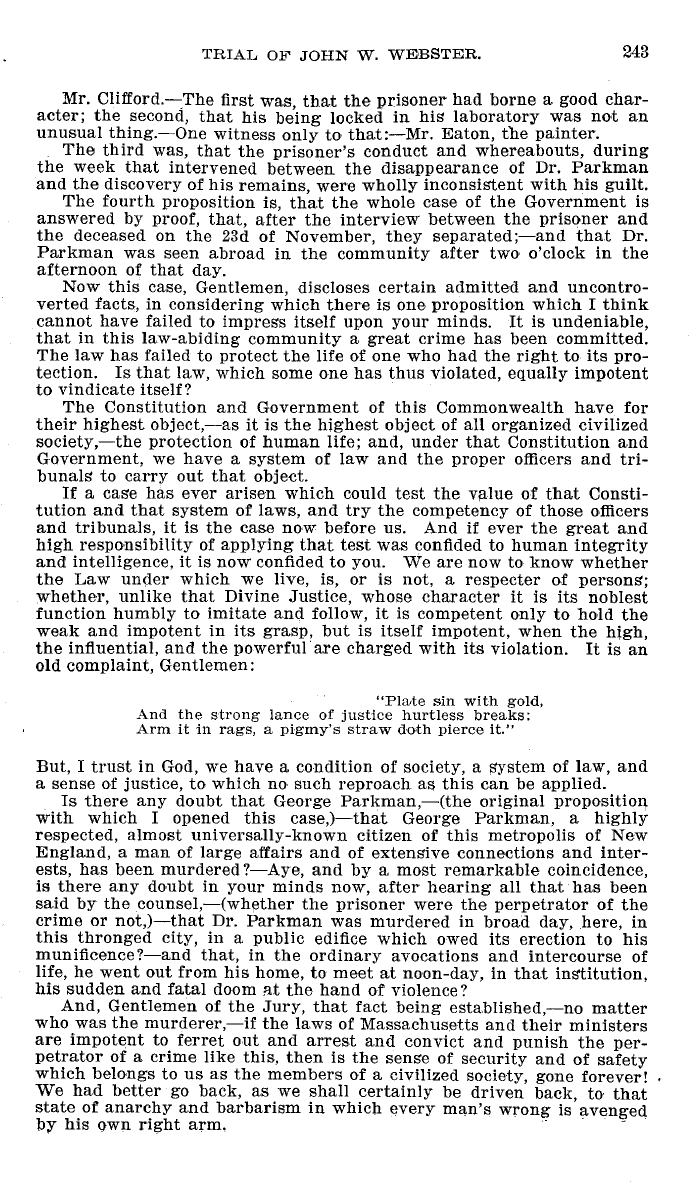|
TRIAL OF JOHN W. WEBSTER. 243
Mr. Clifford.-The first was, that the prisoner had borne a good char-
acter; the second, that his being locked in his laboratory was not an
unusual thing.-One witness only to that:-Mr. Eaton, the painter.
The third was, that the prisoner's conduct and whereabouts, during
the week that intervened between the disappearance of Dr. Parkman
and the discovery of his remains, were wholly inconsistent with his guilt.
The fourth proposition is, that the whole case of the Government is
answered by proof, that, after the interview between the prisoner and
the deceased on the 23d of November, they separated; and that Dr.
Parkman was seen abroad in the community after two o'clock in the
afternoon of that day.
Now this case, Gentlemen, discloses certain admitted and uncontro-
verted facts, in considering which there is one proposition which I think
cannot have failed to impress itself upon your minds. It is undeniable,
that in this law-abiding community a great crime has been committed.
The law has failed to protect the life of one who had the right to its pro-
tection. Is that law, which some one has thus violated, equally impotent
to vindicate itself?
The Constitution and Government of this Commonwealth have for
their highest object,-as it is the highest object of all organized civilized
society,-the protection of human life; and, under that Constitution and
Government, we have a system of law and the proper officers and tri-
bunals to carry out that object.
If a case has ever arisen which could test the value of that Consti-
tution and that system of laws, and try the competency of those officers
and tribunals, it is the case now before us. And if ever the great and
high responsibility of applying that test was confided to human integrity
and intelligence, it is now confided to you. We are now to know whether
the Law under which we live, is, or is not, a respecter of persons;
whether, unlike that Divine Justice, whose character it is its noblest
function humbly to imitate and follow, it is competent only to hold the
weak and impotent in its grasp, but is itself impotent, when the high,
the influential, and the powerful are charged with its violation. It is an
old complaint, Gentlemen:
"Plate sin with gold,
And the strong lance of justice hurtless breaks:
Arm it in rags, a pigmy's straw doth pierce it."
But, I trust in God, we have a condition of society, a system of law, and
a sense of justice, to which no such reproach as this can be applied.
Is there any doubt that George Parkman,-(the original proposition
with which I opened this case,)-that George Parkman, a highly
respected, almost universally-known citizen of this metropolis of New
England, a man of large affairs and of extensive connections and inter-
ests, has been murdered?-Aye, and by a most remarkable coincidence,
is there any doubt in your minds now, after hearing all that has been
said by the counsel,-(whether the prisoner were the perpetrator of the
crime or not,)-that Dr. Parkman was murdered in broad day, here, in
this thronged city, in a public edifice which owed its erection to his
munificence?-and that, in the ordinary avocations and intercourse of
life, he went out from his home, to meet at noon-day, in that institution,
his sudden and fatal doom at the hand of violence?
And, Gentlemen of the Jury, that fact being established,-no matter
who was the murderer,-if the laws of Massachusetts and their ministers
are impotent to ferret out and arrest and convict and punish the per-
petrator of a crime like this, then is the sense of security and of safety
which belongs to us as the members of a civilized society, gone forever!
We had better go back, as we shall certainly be driven back, to that
state of anarchy and barbarism in which every man's wrong is avenged
by his own right arm.
|

